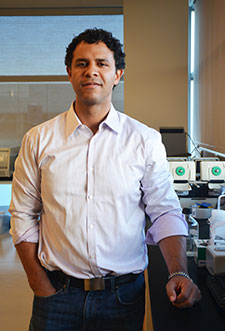
The start of the 2012-13 academic year brings some exciting changes to the department and campus. The new UW Molecular Engineering & Sciences Institute will officially open this September, where Engineering faculty will come together to advance biotech and Clean Tech research. ChemE is also growing with the addition of a new faculty member, Assistant Professor James Carothers. Prof. Carothers, whose research focus is in synthetic biology, will collaborate with faculty in the MolES Institute, supporting the College of Engineering’s Molecular Engineering Initiative.
“I am extremely excited to have Prof. Carothers join our department,” said ChemE Chair Daniel Schwartz. “His outstanding ability to design and control biological routes to chemicals, fuels, and medicines makes him a perfect fit for the department's goal to be a leader in the engineering of molecular and nanoscale systems."
Carothers made two visits to the UW campus earlier this year, meeting with faculty from the department and the college, talking to ChemE students, and touring the new Molecular Engineering & Sciences Institute. “I found the right mix of ingredients for doing great multi-disciplinary work: interesting areas of potential collaboration with friendly colleagues, hard-working graduate students and lots of resources within the department and across the campus,” said Carothers. “Beyond that, MolES — both the outstanding new building and the campus-wide institute — really sold me. There aren't many opportunities for junior people like myself to be involved in multi-disciplinary institutes like this, and I'm really excited about the possibilities there.”
With an office and lab located in the new Molecular Engineering & Sciences Institute, Carothers will continue his research in synthetic biology, using genetic engineering to improve renewable chemicals and fuels production and the development of new therapies. “My own work combines biochemical and biophysical modeling, computational design, directed evolution and genetic engineering,” he said. “There are a lot of interesting overlaps between the experimental approaches I use and the kinds of problems I'm interested in, and what's done by others in the department; hopefully we will be able to do research together that no one group could have done alone.” He plans to develop designable genetic control systems that will increase the sizes and complexities of the synthetic biological systems being engineered. “Ultimately, we would like to develop full-fledged CAD (computer-aided design) platforms that make it easier to engineer biology both for industrial and therapeutic applications (to produce a renewable chemical, for therapeutic tissue engineering, and to provide a low-cost global health material), and for investigating fundamental questions about the role of information and control in biology.”
Carothers is also interested in solving problems outside the lab. As a postdoc at Berkeley, he co-created (with another postdoc) a paid summer engineering research internship program (iCLEM) for low-income high school students and their teachers in the San Francisco Bay Area. “I am a big believer in extending opportunities in science and engineering early and often,” he said. The program is now supported by the National Science Foundation and Joint BioEnergy Institute and has already served 35 students and 6 teachers already.
Carothers holds a Ph.D in Biological Chemistry and Molecular Pharmacology from Harvard University, and a B.S. in Molecular Biophysics and Biochemistry from Yale University. He recently completed a postdoctoral fellowship in Synthetic Biology at the University of California, Berkeley and Department of Energy Joint BioEnergy Institute, working under Prof. Jay D. Keasling. “One of the most important things I've learned from both my Ph.D. advisor Jack Szostak (a 2009 Nobel Prize winner in medicine) and Jay Keasling is to pick hard, interesting problems, and then have the patience to solve them. An important aspect of that is to try to build a research group where people are well supported and given enough freedom to be creative. I know I've been really lucky to have had such great places to do my work, and I'm going to try to create the same kinds of experiences for people in my group at UW.”